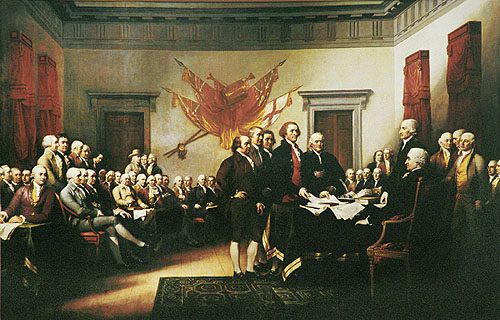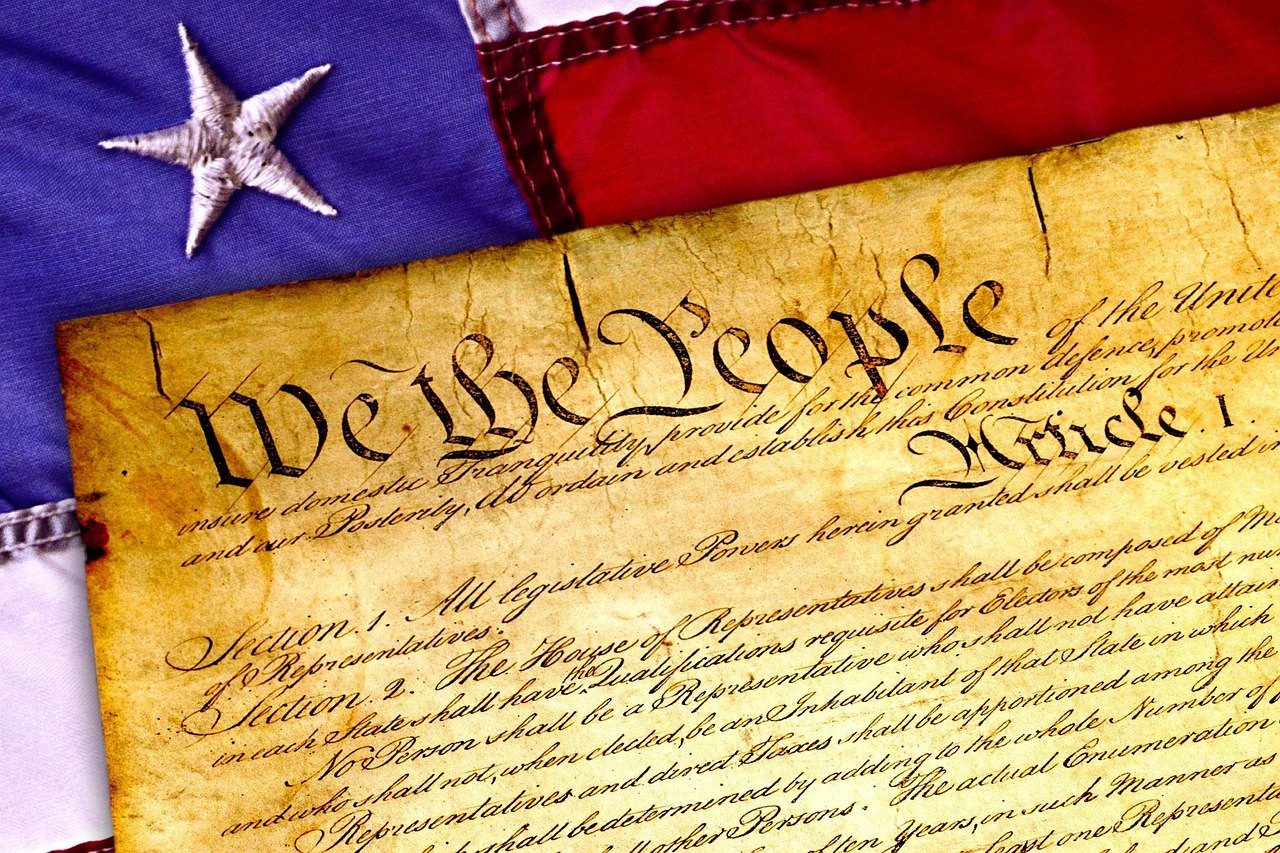
Caesar Rodney was an American hero who neglected his own health to serve in many Continental and state positions. His lifetime struggle with severe asthma and deforming cancer would have relegated most men to the sidelines. He died young but accomplished much including signing the Declaration of Independence. He was a militia officer during the French and Indian War and the Revolutionary War and was president of Delaware during most of the Revolution. His overnight ride to vote on the Declaration was the stuff of legends.
Caesar Rodney was born on 7 October 1728 on the family plantation, Poplar Grove (Byfield today), located on St. Jones Neck in East Dover Hundred in Kent County, Delaware. He was the eldest son of eight children of Caesar Rodney and Elizabeth Crawford.
The only formal education young Caesar Rodney received was at the Latin School in Philadelphia, Pennsylvania, which ended when his father died in 1746. At age 17, he was the oldest male and therefore heir to his father’s estate. He became responsible for the care of his mother and siblings, and for managing Poplar Grove plantation. Poplar Grove was already a successful and prosperous farm, and the Rodneys were influential members of the local gentry. Caesar was also placed under the guardianship of Nicholas Ridgely, a prominent citizen of Dover, Delaware. It is believed that Ridgely was the source of Rodney’s interest in politics.
We know that Caesar’s health was terrible. He was tormented his entire life by severe asthma and during his adult life he suffered from a facial cancer. He underwent expensive, painful, and totally futile medical treatments for the cancer. Rodney always wore a green scarf to hide his disfigured face. Despite his health problems, he put all his energy into becoming the single most valuable and productive citizen in Delaware.
Eighteenth century Delaware was socially and politically divided and volatile. There were two major political parties. The majority Court Party worked well with the colonial government and favored reconciliation with Britain. The minority Country Party favored independence. Despite being members of the gentry, Caesar and his brother Thomas identified with the Country Party.
The political career of Caesar Rodney began in 1755 when he was appointed sheriff of Kent County. After serving three years he was appointed and elected to many more positions, including Register of Wills, Recorder of Deeds, Clerk of the Orphan’s Court, Justice of the Peace, and judge in the lower courts. He was commissioned captain in the Dover Hundred militia company during the French and Indian War.
Caesar was a delegate to the Stamp Act Congress in 1765 and was a leader of the Delaware Committee of Correspondence. He was Speaker of the Delaware Assembly when Delaware voted to sever all ties with Britain on 15 June 1776. From 1769 through 1777, he was an associate justice of the Supreme Court of the Lower Counties.
Thomas McKean, George Read and Caesar Romney served in the Continental Congress from 1774 through 1776. Rodney’s most famous exploit occurred during the debate on the Declaration of Independence. Richard Henry Lee introduced his resolution for independence on 7 June 1776, which resulted in weeks of contentious debate. Unanimous consent on independence was eluding the congress, so they recessed. During the recess, the Delaware State Assembly released their delegates to vote their individual judgment.

Rodney was in Delaware dealing with militia and Loyalist problems. In Philadelphia, the Delaware vote on independence was deadlocked with McKean “for” and Read “against.” McKean sent a courier to Rodney advising him of the deadlock and he immediately left for Philadelphia. He rode all night through a torrential rainstorm and arrived at Congress on 2 July 1776 muddy, wet, and fatigued but “booted and spurred.” The 80-mile trip had taken eighteen hours and unfortunately Rodney also arrived seriously ill. He broke the Delaware tie which led to the unanimous vote for independence on 4 July 1776. All three Delaware delegates signed the Declaration of Independence in August.
Caesar’s own account of his ride and vote was contained in a letter to Thomas which reads: “I arrived in Congress (tho detained by thunder and rain) time enough to give my voice in the matter of independence…We have now got through the whole of the declaration and ordered it to be printed so that you will soon have the pleasure of seeing it.”
Loyalist Sentiment in Kent County was strong so Rodney’s vote earned him rejection. He lost his attempt to join the state legislature and was not returned to the Continental Congress.
Rodney’s friend John Haslet was killed while rallying troops during the 3 January 1777 Battle of Princeton, New Jersey. (The Battles of Trenton [26 December 1776] and Princeton were major morale boosters for the Continentals before they went into winter quarters.) Despite his poor health, Rodney rushed to the Continental Army to fill Haslet’s place, but his friend General Washington believed he would be more useful in Delaware.
Caesar Rodney served as Delaware’s wartime governor and as major general of the Delaware Militia. The militia was busy dealing with conflicts between Loyalist and Patriot groups in the state and defending against the many British incursions. The British Navy often sailed into Delaware’s many rivers foraging for food, intelligence, and to press men into service. The British also occupied northern Delaware, and at the request of General Washington, Rodney took field command to oppose them. Also, under Rodney’s leadership, Delaware had a record of exceeding its quotas of troops and provisions for the Continental Army.
In October 1777 Rodney and McKean were returned to the Continental Congress, and Rodney was elected President of Delaware in March 1778. Ratification of the Articles of Confederation was quite contentious in Delaware and consumed much of his flagging energy. Rodney was quite frail. Poor health was catching up with this man who was giving his all to the birth of the nation.
Rodney was elected to the United States Congress under the Articles of Confederation in 1782 and 1783 but was too ill to attend. He was elected to the Delaware Legislative Council in 1783 and as a final gesture of respect he was appointed speaker. The Council met in Caesar’s home because of his rapidly failing health, but he died before the session ended.

Caesar Romney died on 26 June 1784 and was buried at his beloved home of Poplar Grove on Byfield plantation. There is a large grave marker for Caesar at Dover Christ Episcopal Church Cemetery, but it is believed a relative is buried there. Most historians believe that Caesar is buried in an unmarked grave in the unmarked family plot at Poplar Grove just east of present-day Dover Air Force Base. He was never married, and willed his estate to his nephew, Caesar Augustus Rodney. The will also provided for the gradual freedom of his Poplar Grove slaves.
Rodney’s health was bad his entire life. He had severe asthma and endured disfiguring and painful facial cancer for years. Under those circumstances, most men would have withdrawn from the public eye. Rodney, however, immersed himself in service including serving in Congress, and serving in the military during wartime. No Delaware citizen in history has come close to holding the number of significant offices that Caesar Rodney held during his career. Rodney literally worked himself to death helping to found the United States of America.
There are no known portraits of Caesar Rodney, and we have only two reliable descriptions of him. His brother Thomas described him as having “a great fund of wit and humor of the pleasing kind, so that his conversation was always bright and strong and conducted by wisdom…” The only physical description of Caesar was an entry in the diary of John Adams in September 1774. Adams wrote: “Saturday…this forenoon Mr. Caesar Rodney of the lower counties on Delaware River..was introduced to us. Caesar Rodney is the oddest looking man in the world; he is tall, thin and slender as a reed, pale; his face is not bigger than a large apple, yet there is sense and fire, spirit, wit and humor in his countenance.”

A statue of Rodney represents Delaware in Statuary Hall in the U.S. Capitol. A large equestrian statue of Rodney, memorializing his famous ride, is in Rodney Square in downtown Wilmington, Delaware. (This statue was removed in July 2020 to “protect” it and to allow a “discussion” on monuments of slave owners.) A Delaware school district is named after him.
Caesar Rodney was a true American patriot whose real monument cannot be removed by those who desecrate statues of patriots and seek to rewrite history. Rodney’s real monument and legacy are his signature on the Declaration of Independence, and other contributions to the cause of freedom that all Americans, including the statue desecraters and removers, still enjoy.

